|
|
|
Sort Order |
|
|
|
Items / Page
|
|
|
|
|
|
|
| Srl | Item |
| 1 |
ID:
117740
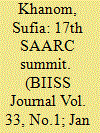

|
|
|
|
|
| Publication |
2012.
|
| Summary/Abstract |
This paper attempts to analyse the discussed issues and outcomes of the seventeenth SAARC Summit which took place in the Maldives from 10-11 November 2011 with a special reference to Bangladesh in the context of regional cooperation. Several significant and strategically important agreements were signed during this Summit with the intention to begin a new era of cooperation among the member countries. Therefore, the Summit declaration adopted several treaties like SAARC Agreement on Rapid Response to Natural Disasters, SAARC Seed Bank, SAARC Agreement on Multilateral Arrangement on Recognition of Conformity Assessment, and the SAARC Agreement on Implementation of Regional Standards. The agreements focused on enhancing and facilitating regional transit and connectivity, economic growth, ensuring energy security, combating terrorism and human trafficking and fight climate change. Though the Summit has come up with some promising mutual agreements, its success will depend on their proper and timely implementation. The lack of political will, problem of poor governance, weak economy and disparity, crisis of political leadership, ethnic, socio-cultural and religious divisions, challenges of non-state actors, transnational security challenges are considered to be the major hindrances to the success of regional integration. The South Asian region should develop its own short, medium, and long-term strategies for economic integration where each stage should be implemented effectively before moving on to the next in order to build a sound foundation for progress. The inclusion of China as 'dialogue partner' would help SAARC to make the tangible progress for regional cooperation in South Asia. The new focus on regional integrations is likely to create exciting opportunities for Bangladesh if it can exploit the synergies based on comparative advantages, investment in cross-border infrastructure projects, address challenges in governance, environmental and social developments.
|
|
|
|
|
|
|
|
|
|
|
|
|
|
|
|
| 2 |
ID:
108878
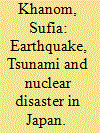

|
|
|
|
|
| Publication |
2011.
|
| Summary/Abstract |
This paper attempts to assess the impacts of the devastating natural disaster - earthquake followed by tsunami, that shook Japan on 11 March 2011, from socio-economic and development point of view. The intensity of the disaster was reflected through a destructive earthquake measuring 8.9 on Richter scale along with a tsunami at a speed of 500 miles/hour. Though, Japan is technologically and economically developed, it described the disaster as the worst crisis in the 65 years of its history since the end of World War II. Huge humanitarian crisis and massive disruption of industrial supply chains negatively affected the economic growth of Japan and put enormous stress on the psyche of Japanese people. The plight of the people had been compounded further by the threat of radiation exposure from the damaged reactors of nuclear power plants at Fukushima. The mishap at nuclear power plants at Fukushima posed some serious questions to the world: how safe nuclear power plants really are? Should the world look for a safer alternative to power problems? The disaster in Japan and its consequences have some serious impacts on Bangladesh from a development perspective. Japan has long been the principal donor and biggest development partner of Bangladesh. But the ongoing crisis in Japan may pose a threat or create some degree of uncertainty to the long term development planning of Bangladesh. Besides, the catastrophic experience of Japan has made Bangladesh rethink about its readiness to encounter similar disasters. As a climate induced vulnerable country, Bangladesh should strengthen its disaster management system by ensuring early warning system, as well as improving rescuing and relief management mechanism to combat such natural calamities.
|
|
|
|
|
|
|
|
|
|
|
|
|
|
|
|
| 3 |
ID:
111761
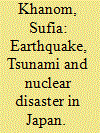

|
|
|
| 4 |
ID:
165532
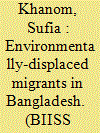

|
|
|
|
|
| Summary/Abstract |
This article has brought a critical perspective to the gendered nature of insecurity as experienced by environmentally-displaced migrants through their everyday experiences of insecurity and its effect on their long-term capability. Both anthropogenic interventions and natural calamities in the coastal zones directly affect one quarter of Bangladesh and the many people living in these regions. Unexpected flows of migration shape both the nature of cities and development processes. Dhaka already has a large influx of migrants and is expected to receive a greater influx of environmentallydisplaced migrants due to the better economic opportunities available there compared with other parts of the country. Different development sectors, utility services and infrastructure developments have expanded rapidly but have been unable to keep pace with the demand of the growing population. There is a lack of coordination between different government bodies in terms of implementation of policies, rules and regulations. The gap between service provision and demand is further exacerbated by mismanagement and brings every day to long-term insecurities of its residence. This insecurity also arises not only from ‘being a man’ or ‘being a woman’ or ‘being a migrant’, but is also due to specific practices, processes and power relations within the social institutions at individual, community, national and regional level. Environmental change is a global phenomenon and environmentallydisplaced migrants are forced to take the decision to migrate like refugees. Yet, the protection of environmentally-displaced migrants is neither fully a global nor a national responsibility. There remains insufficient attention to protect the rights of environmentally-displaced migrants.
|
|
|
|
|
|
|
|
|
|
|
|
|
|
|
|
| 5 |
ID:
094313
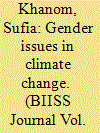

|
|
|
| 6 |
ID:
078102
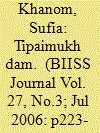

|
|
|
|
|
|
|
|